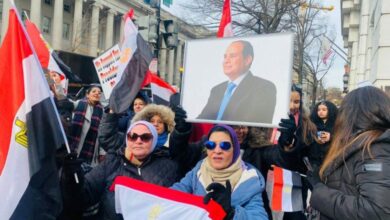After almost two weeks of avoiding discussing Mohamed ElBaradei, state-run papers today highlight the controversy surrounding the former head of the International Atomic Energy Agency who has suggested he would run for president in 2011 if elections are free and fair.
Opposition and independent papers, on the other hand, note that the US administration might call for more democratic reforms in Egypt, a slight shift from the “stability overrides change” strategy pursued by US President Barack Obama since he assumed office a year ago.
Al-Akhbar runs a front-page story about a “popular trial” of ElBaradei organized by six tiny opposition parties in Cairo yesterday. According to the report, the opposition parties, none of which has ever been represented in parliament, condemned ElBaradei for allegedly providing a legal pretext for US troops to invade Iraq in 2003 when he was serving as the director of the International Atomic Energy Agency. ElBaradei, the opposition parties charge, has now changed his focus to serve America’s hidden agenda in Egypt, which is spreading chaos and instability in the country.
Abdellah Kamal, editor-in-chief of the official daily Rose el-Youssef, also accuses ElBaradei of disrupting local politics. Publishing ElBaradei’s portrait next to photos of Israeli Prime Minister Benjamin Netanyahu, Iranian President Mahmoud Ahmadinejad, and Ayman al-Zawahiri, al-Qaeda’s ideological guru, Kamal writes that ElBaradei’s support for legalizing the Muslim Brotherhood, Egypt’s strongest opposition group, would “fume the sectarian situation in Egypt, and create divisions along ethnic and religious lines.”
Kamal, who is also a member of the ruling National Democratic Party’s influential Policies Secretariat, warns against ElBaradei’s attempt to replicate the “Ukrainian Scenario,” a reference to the protests that took place between November 2004 and January 2005 (dubbed the "Orange Revolution") following Ukraine’s contraversial presidential elections. (In the end, the protest movement brought about a more democratic political system in Ukraine.)
Al-Shorouq leads with a story about the upcoming meeting between President Mubarak and US Vice President Joseph Biden under the heading “2011 elections is a top priority in the dialogue with Washington.” The story highlights US media coverage of Gamal Mubarak’s lack of popularity and his attempts to portray himself as “one of the people.” The independent daily stresses that the US administration does not plan to get involved in Egyptian affairs and does not have a favored candidate in the upcoming election.
Al-Wafd also focuses on ElBaradei, with a similar story about American reactions to his possible candidacy in the upcoming presidential election, and another story on ElBaradei’s warning that he will engage in "civil disobedience.”
"People talk about everything and maybe they will engage in civil disobedience if change doesn’t occur,” ElBardei is quoted as saying in response to questions from the international press about the elections.
Former presidential candidate Ayman Nour writes in Al-Dostour about his position vis-a-vis ElBaradei, responding to recent attempts in the media to create a rift between him and El Baradei’s supporters. Nour says he has tried to “warn his followers from falling into the media’s trap” that aim to divide the opposition.
In other news, state and independent papers both report on the case against Hisham Talaat Mostafa and Mohhsen El Sokary, who were recently convicted and sentenced to death for the July 2008 murder of Lebanese singer Susan Tamim. Their lawyers have appealed the verdict, on which the court will rule later today.
Al-Ahram and Al-Akhbar also covered the new insurance and pension draft law, passed by the People’s Assembly and which is now before the Shura Council for ratification. The law, Al-Akhbar states, consists of 111 articles that cover “insurance against senescence risks, impotence, death, work accidents, and unemployment.” The new law covers pensions, work insurance and unemployment insurance.
Al-Ahram says that over the course of 17 years, starting in 2015, the law will gradually raise the retirement age from 60 to 65, at a rate of one-year every three years. According to Al-Ahram and Al-Akhbar, the pensions will be “without a maximum limit,” though the papers also report that they could cover up to 80 percent of pentioners’ salaries. Moreover, the percentage taken out of an employee’s monthly salary to fund their insurance and pension has been lowered from 14 to 9 percent.
The new law also gives citizens the right to collect more than one form of pension or insurance. Al-Ahram gives the example of a child who will be able to collect pensions of both their parents or widows who will be able to get their spouse’s pension even if they maintain another source of income. The new law also includes a host of other reforms, including providing seasonal workers the opportunity to obtain insurance.
Minister of Finance Youssef Botrous Ghali praises the new law’s potential benefits, stating that it “will change the setting in which the Egyptian economy operates,” according to Al-Ahram. Ghali anticipates the law will help raise "the national savings rate from 14 to 18 percent of national income,” which in turn will boost economic growth by “at least 9 percent.”
Egypt’s newspapers:
Al-Ahram: Daily, state-run, largest distribution in Egypt
Al-Akhbar: Daily, state-run, second to Al-Ahram in institutional size
Al-Gomhorriya: Daily, state-run
Rose el-Youssef: Daily, state-run, close to the National Democratic Party’s Policies Secretariat
Al-Dostour: Daily, privately owned
Al-Shorouq:Daily, privately owned
Al-Wafd: Daily, published by the liberal Wafd Party
Al-Arabi: Weekly, published by the Arab Nasserist party
Youm7: Weekly, privately owned
Sawt el-Umma: Weekly, privately owned




